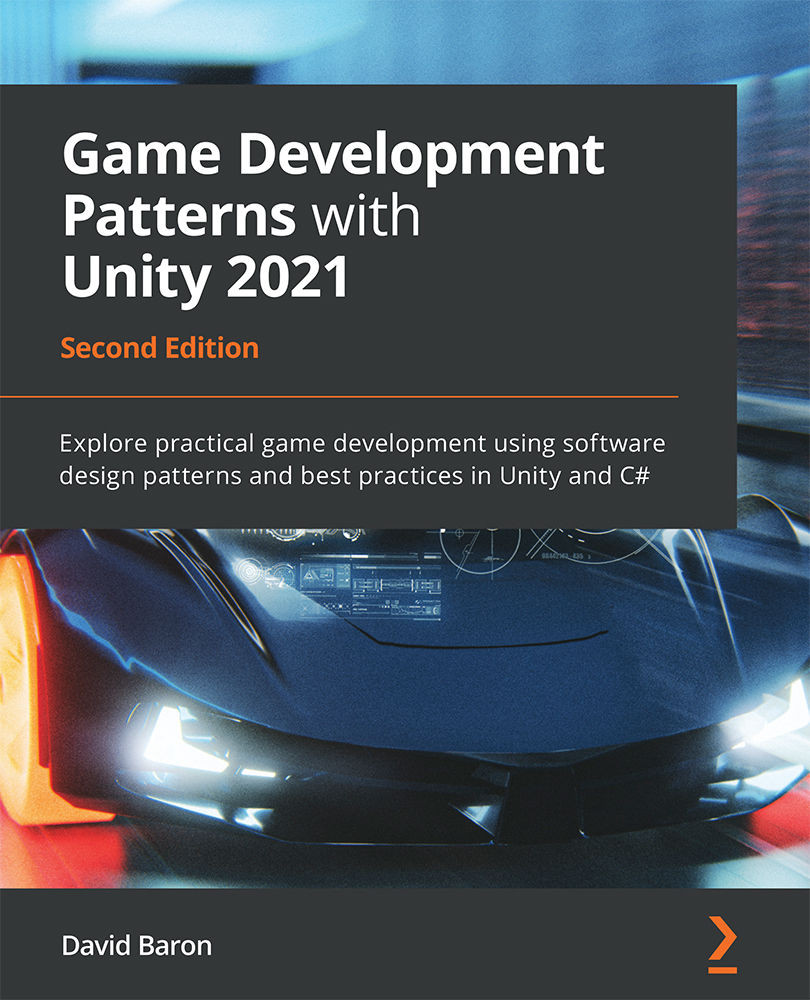In most video games, there are a lot of things happening on the screen. Bullets are flying around, enemies are spawning around the map, particles are popping up around the player, and these various objects are loaded and rendered on the screen in the blink of an eye. So, to avoid putting strain on the Central Processing Unit (CPU) while maintaining a consistent frame rate, it's a good practice to reserve some memory for our frequently spawned entities. So, instead of releasing recently destroyed enemies from memory, we add them to an object pool to recycle them for later use. With this technique, we avoid the initial initialization cost of loading a new instance of an entity. In addition, because we are not destroying reusable entities, the Garbage Collector (GC) won't waste cycles cleaning a set of regularly reinitialized...
-
Book Overview & Buying

-
Table Of Contents

Game Development Patterns with Unity 2021 - Second Edition
By :

Game Development Patterns with Unity 2021
By:
Overview of this book
This book is written for every game developer ready to tackle the bigger picture and start working with advanced programming techniques and design patterns in Unity.
Game Development Patterns with Unity 2021 is an introduction to the core principles of reusable software patterns and how to employ them to build components efficiently.
In this second edition, you'll tackle design patterns with the help of a practical example; a playable racing game prototype where you’ll get to apply all your newfound knowledge. Notable updates also include a game design document (GDD), a Unity programming primer, and the downloadable source code of a complete prototype.
Your journey will start by learning about overall design of the core game mechanics and systems. You’ll discover tried-and-tested software patterns to code essential components of a game in a structured manner, and start using classic design patterns to utilize Unity's unique API features.
As you progress, you'll also identify the negative impacts of bad architectural decisions and understand how to overcome them with simple but effective practices.
By the end of this Unity book, the way you develop Unity games will change – you’ll adapt a more structured, scalable, and optimized process that will help you take the next step in your career.
Table of Contents (22 chapters)
Preface
Sections 1: Fundamentals
 Free Chapter
Free Chapter
Before We Begin
The Game Design Document
A Short Primer to Programming in Unity
Section 2: Core Patterns
Implementing a Game Manager with the Singleton
Managing Character States with the State Pattern
Managing Game Events with the Event Bus
Implement a Replay System with the Command Pattern
Optimizing with the Object Pool Pattern
Decoupling Components with the Observer Pattern
Implementing Power-Ups with the Visitor Pattern
Implementing a Drone with the Strategy Pattern
Using the Decorator to Implement a Weapon System
Implementing a Level Editor with Spatial Partition
Section 3: Alternative Patterns
Adapting Systems with an Adapter
Concealing Complexity with a Facade Pattern
Managing Dependencies with the Service Locator Pattern
About Packt
Other Books You May Enjoy
